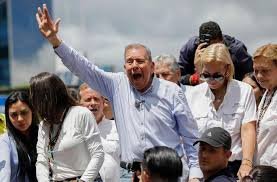Edmundo Gonzalez, a prominent Venezuelan opposition leader, is determined to continue his fight for democracy in Venezuela after being granted asylum in Spain. The 75-year-old politician left Venezuela amid heavy pressure and threats following the disputed elections held on July 28, in which President Nicolas Maduro claimed victory. The election result has been widely questioned by Gonzalez and several international organizations, which have raised concerns over electoral integrity and fairness.
Venezuelan exodus: Seeking safety in Spain
Gonzalez’s departure from Venezuela did not come without drama. After spending several weeks hiding in the Spanish embassy in Caracas, he and his wife finally left the country on Saturday, arriving safely at the Torrejon de Ardoz military airbase in Madrid, Spain at around 16:00 local time. In an audio message shared by his press team after his arrival, Gonzalez expressed his gratitude to his supporters and reaffirmed his commitment to fight for Venezuela’s freedom and democracy.

“I am confident that we will continue the fight for the restoration of freedom and democracy in Venezuela soon,” he said. Before leaving Venezuela, Gonzalez had faced serious threats and accusations from the Maduro government. Venezuelan authorities had issued an arrest warrant for him, accusing him of serious crimes including conspiracy and forging documents. However, Gonzalez has denied all the charges and described them as fabricated by the government to suppress dissent. Climate of fear and repression The atmosphere in Venezuela has been tense since the July elections. Opposition groups, international observers and several countries have questioned the legitimacy of the election results. They claim that Maduro’s government used its control over electoral institutions to manipulate the results and maintain its grip on power. Opposition leader Maria Corina Machado,

who was expected to contest the election against Maduro, was prevented from doing so by institutions loyal to the president. The move was seen as a strategic attempt to prevent a credible opposition challenge. Machado, a popular figure in Venezuela, explained on social media that Gonzalez decided to leave the country because “his life was in danger.” She cited the “brutal wave of repression” launched by the Maduro government against opposition leaders after the election. Her comments echoed the fears of many opposition supporters, who believe Maduro is using the state machinery to suppress any dissent.
International reactions and condemnation
The international community has reacted strongly to the developments in Venezuela. Many countries, including the United States and members of the European Union, have refused to recognize Maduro’s claim of victory without more transparent evidence. The opposition released a detailed voting tally online, which they claim showed Gonzalez won by a significant margin. However, the Venezuelan government has not released comprehensive polling data to verify or refute these claims.
US Secretary of State Antony Blinken condemned Gonzalez’s forced departure from Venezuela and called it the result of “anti-democratic measures” imposed by the Maduro regime. “The results of the election and the will of the people cannot be simply sidelined by Maduro and Venezuela’s electoral authorities. We stand with Gonzalez in his call to continue the struggle for the restoration of freedom and democracy in Venezuela,” Blinken said. European Commission Vice President Josep Borrell also weighed in, calling the day of Gonzalez’s departure a “sad day for democracy in Venezuela.” He stressed that “no political leader should be forced to seek asylum in another country” and called for the release of all political prisoners in Venezuela. Spain’s response: Offers asylum and support Spain has taken a supportive stance towards Gonzalez and the broader Venezuelan opposition movement. Spanish Prime Minister Pedro Sanchez praised Gonzalez, calling him “a hero whom Spain will not abandon.” His government has granted Gonzalez asylum, citing its commitment to protecting the political rights of the Venezuelan people. Spanish Foreign Minister Jose Manuel Alberes echoed this sentiment, saying Spain is dedicated to supporting democracy in Venezuela and protecting those who face repression.

Gonzalez’s arrival in Spain has further escalated existing tensions between Madrid and Caracas. Venezuela’s foreign ministry has accused the Spanish government of meddling in its internal affairs. This diplomatic row is expected to continue as Spain, along with other European countries, continues to press for democratic reforms in Venezuela.
Political turmoil and uncertain future in Venezuela
Meanwhile, the situation in Caracas remains tense. Security forces have surrounded the Argentine embassy, where six opposition leaders are reportedly seeking asylum. The Venezuelan government has alleged that “terrorist acts” are taking place
